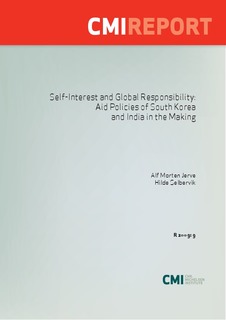Self-interest and global responsibility: Aid policies of South Korea and India in the making
Research report
Permanent lenke
http://hdl.handle.net/11250/2436071Utgivelsesdato
2009Metadata
Vis full innførselSamlinger
- Bora-import [434]
Sammendrag
How can we understand the emerging donors? The role of ‘emerging’ donors is currently at the heart of the international aid discourse, but so far, the knowledge of these actors in aid is inadequate. There is a need to explore what they are representing. This study investigates the aid policies of India and South Korea. Both countries represent a rather diverse group of countries that has been lumped together as ‘emerging’ donors. The better part of the existing studies on emerging donors is focusing on Chinese aid. Less attention is being devoted to other countries. Together with Japan, the increased aid ambitions of China, South Korea and India herald a growing Asian influence on the global aid architecture. What will be the effects? Will an Asian approach to development assistance emerge? The answers are yet to come, but a comparison of South Korea’s and India’s aid policies does provide some indications. Central to this is how tensions between self-interest and global responsibility are articulated, or glossed over, as some would argue, when Asian donors refer to the principle of “mutual benefit”.
Utgiver
Chr. Michelsen InstituteSerie
Research reportR 2009: 9
